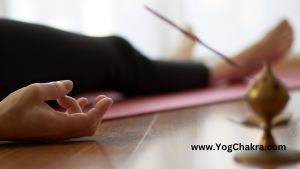Discover the transformative power of yoga in tackling sleep disorders. Unveil the path to sound sleep and enhanced well-being through yoga and Yoga Nidra
— Preeti Razdan
SAN JOSE, CALIFORNIA, US, July 6, 2023/EINPresswire.com/ — In our modern, hectic lives, sleep disorders have become a widespread concern, impacting countless individuals worldwide. From insomnia and sleep apnea to restless legs syndrome and sleep deprivation, these conditions can leave us feeling drained and unrefreshed. While medication may offer temporary relief, a holistic approach to sleep health is essential for long-term well-being.
Enter yoga—a time-honored practice that not only enhances physical fitness but also provides profound benefits for improving sleep quality
Here is how Yoga including the transformative practice of Yoga Nidra, can help you effectively manage sleep disorders and unlock restful nights of slumber.
1. Calming the Mind and Easing Stress
Stress and anxiety often play a significant role in sleep disorders. Yoga offers a sanctuary for the mind, providing a space to release tension and find inner peace. Through deep breathing exercises, known as pranayama, and mindful meditation, yoga helps calm the mind, reduce stress levels, and induce a sense of tranquility. These practices, when integrated into our daily routines, create a peaceful mental environment that prepares us for a deep and restorative sleep experience.
2. Cultivating Mindfulness
Yoga encourages the cultivation of mindfulness, the art of being fully present in the moment and observing our thoughts without judgment. By practicing mindfulness on and off the mat, we learn to let go of racing thoughts and worries that disrupt our sleep. This heightened awareness allows us to focus on the present, fostering a sense of relaxation and gently guiding us into a restful slumber.
3. Relaxation and Restoration with Yoga Nidra
Yoga Nidra, often referred to as “yogic sleep,” is a powerful practice for combating sleep disorders. It is a guided meditation technique that systematically relaxes the body and mind, leading to a state of profound rest and rejuvenation. By following the instructions of a trained instructor or through pre-recorded sessions, practitioners are guided through different stages of relaxation, consciously releasing physical, mental, and emotional tension. Through body awareness, breath work, and guided imagery, Yoga Nidra reduces stress, improves sleep, and enhances overall well-being. It can also lead to personal transformation and spiritual growth. Regular practice of Yoga Nidra can bring about profound relaxation, healing, and self-discovery.
4. Releasing Physical Tension
The physical postures, or asanas, in yoga, not only promote flexibility and strength but also release tension and stress from the body. Certain poses, such as Child’s Pose (Balasana), Forward Fold (Uttanasana), and Legs-Up-the-Wall (Viparita Karani), activate the parasympathetic nervous system, triggering the body’s relaxation response. These restorative poses help relieve muscle tension, lower blood pressure, and slow down the heart rate, creating an optimal environment for a peaceful night’s sleep.
Source: https://www.healthline.com/health/restorative-yoga-poses
5. Harnessing the Power of Breath
Controlled breathing techniques, known as pranayama, form an integral part of yoga practice and are highly effective in managing sleep disorders. Practices such as Alternate Nostril Breathing (Nadi Shodhana) and Deep Abdominal Breathing (Ujjayi Breath) are known to have calming effects on the nervous system. These techniques can help reduce anxiety and promote relaxation. By incorporating these practices into our bedtime routine, we can create a soothing environment for our body and mind, facilitating restful and uninterrupted sleep.
Source:https://www.ncbi.nlm.nih.gov/pmc/articles/PMC5660749/
Takeaway
Yoga, alongside the transformative practice of Yoga Nidra, offers a comprehensive and natural approach to managing sleep disorders. By integrating yoga into our daily lives, we can experience reduced stress levels, improved mindfulness, relaxation of the body, regulated breath, and an overall sense of well-being. Yoga Nidra, in particular, unlocks deep rest and restoration, allowing for profound healing and rejuvenation during sleep. Embracing the practice of yoga empowers us to take control of our sleep health, enabling us to awaken feeling refreshed, revitalized, and ready to embrace each new day. No wonder the popularity of Yoga continues to rise and we have Yoga Statistics to prove the fact!
So, unroll your mat, connect with your breath, and embark on the journey towards restful nights and revitalized mornings through the power of yoga and Yoga Nidra.
Explore more Yoga and wellness resources on www.YogChakra.com
Preeti Razdan
Yapree LLC
+1 408-320-5793
email us here
Visit us on social media:
Facebook
Twitter
LinkedIn
Instagram
YouTube
Other
Journey to Deep Relaxation: Mastering Yoga Nidra in 10 Simple Steps
![]()






